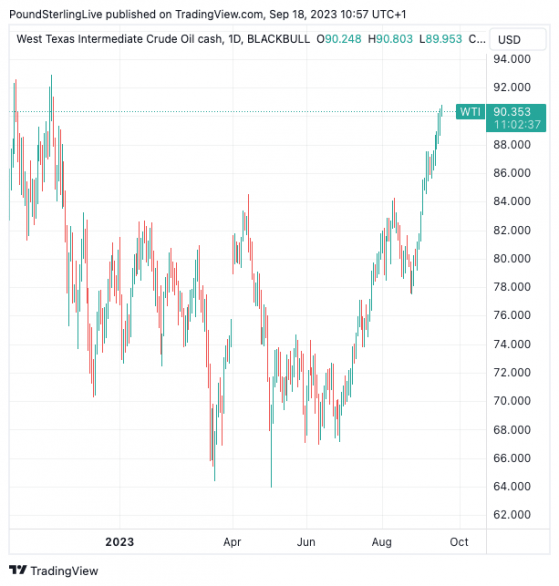PoundSterlingLIVE - Written by Marios Hadjikyriacos, Senior Investment Analyst at XM.com. An original version of this article can be viewed here.
A pivotal week for global markets kicks off with another sharp spike in oil prices.
The non-stop rally has seen WTI crude prices rise more than 30% this quarter, driven by a classic supply shortage after Saudi Arabia and Russia decided to curtail their production.
What's striking is that this relentless oil price rally has taken place even amid concerns about lower demand from Europe and China as those economies grapple with a severe slowdown, which demonstrates just how tight the supply side of the equation has become.
The fact that oil rallied on Friday despite the risk-off tone in equity markets adds credence to this notion.
Rising oil prices have repercussions far beyond energy markets, as they simultaneously squeeze consumers and stoke inflationary pressures.
In turn, this complicates life for central banks that are now faced with the risk of persistently high inflation heading into an economic slowdown.
In the markets, soaring oil prices translate into bad news for the currencies of energy-importing economies, most notably the Eurozone and Japan, initially through the trade channel and then by dampening economic growth.
Hence, the evolution of energy prices will be crucial for the euro and yen, which are already on the ropes.
The dollar took a small step back on Friday and remains on the defensive today. With US yields reaching new cycle highs and equity markets on the retreat, it is surprising that the dollar could not move higher.
There might be an element of caution creeping in ahead of the FOMC decision on Wednesday, keeping dollar traders on guard.
Beyond the Fed, there are also central bank meetings in the United Kingdom, Switzerland, and Japan on the agenda.
Hence, it will be a week packed with volatility.
Gold prices staged an impressive recovery on Friday, bouncing back to erase all the losses from earlier in the week and trade even higher.
The fact that bullion managed to close higher on a week when the US dollar and Treasury yields climbed is a victory in itself and suggests there’s ‘real’ demand for gold under the surface, most likely due to central banks raising their reserves.
Underscoring this point is that gold is trading less than 8% away from record highs, even with yields breaking to new cycle highs. Hence, bullion is displaying relative resilience, although that is not enough to turn the outlook positive.
For that to happen, the economic landscape would need to shift so that markets panic about a recession and there’s speculation of Fed rate cuts, which is not on the horizon yet.
An original version of this article can be viewed at Pound Sterling Live
